Cerebral Palsy in Aotearoa New Zealand: Early identification, surveillance and beyond Cerebral Palsy Education Day Friday 9th of July 2021 via zoom

Kia ora koutou katoa, Our cerebral palsy education day is targeted for health professionals and whānau / people with lived experiences to share findings and developments from a range of cerebral palsy related projects and developments. The focus of this virtual education day is driven by the ‘CaPTuRE: Cerebral Palsy Translating Research on Early identification’ study, which aimed to capture current practice in early management of cerebral palsy in New Zealand, and support information sharing around best practice. The day also includes the Launch of the NZCYCN CP Clinical Network early diagnosis and intervention best practice recommendations, and includes an exciting session on Communication, with and between families, health professionals and engaging with Māori whānau. At the conclusion of the day, the session focuses on preventative surveillance strategies, including the International CP Respiratory Guidelines workshop, led by Dr Noula Gibson (Perth, Australia), and an important update of the AusACPDM Hip Surveillance Guidelines. We would like to thank and acknowledge the Starship Foundation for supporting this work, as well as our collaborating partners of health professionals and community members and people with lived experience of cerebral palsy across New Zealand, who have honoured us with their work, sharing of information and experiences.
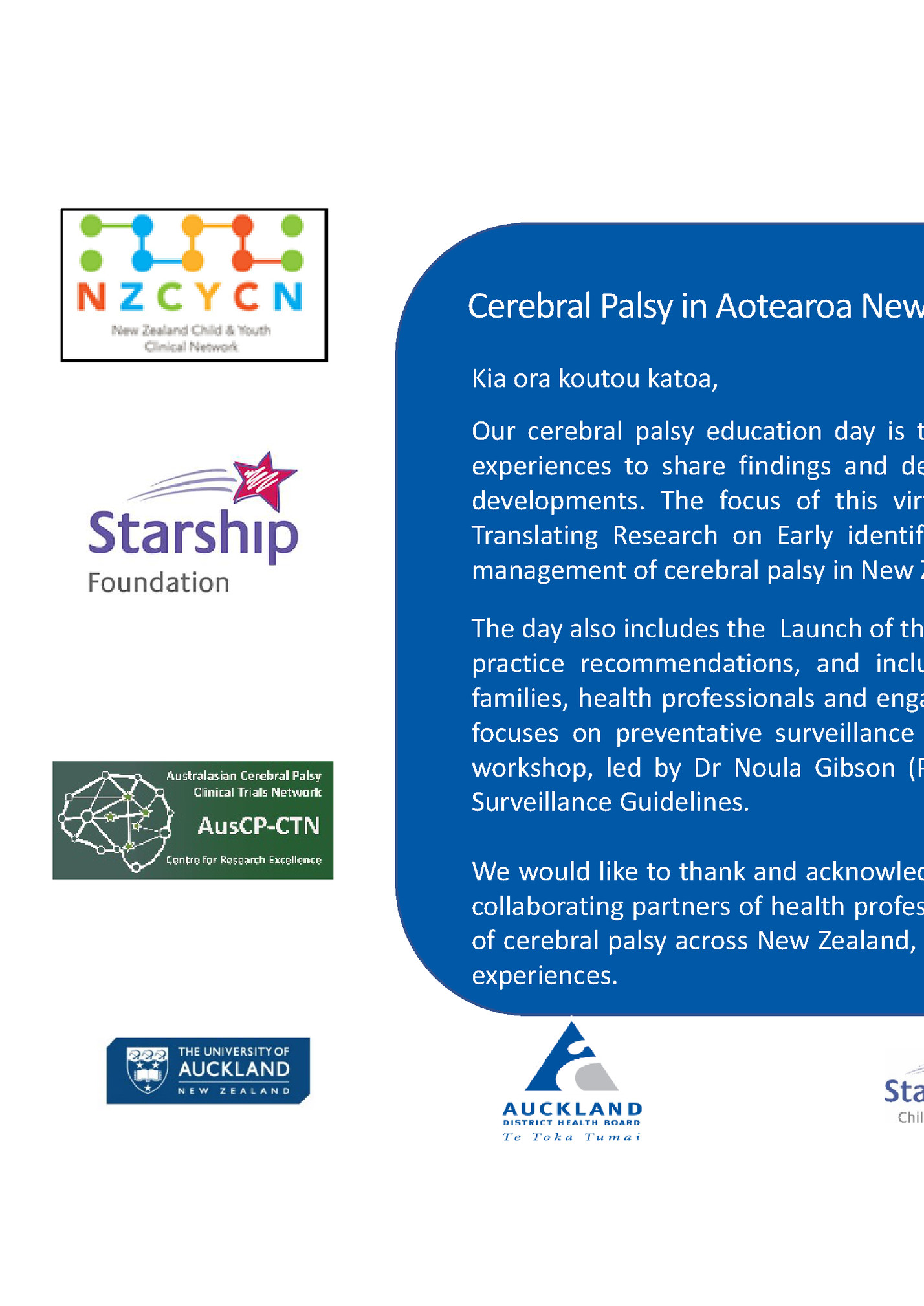
Time Session 1 Current practice 9:00-10:30 Speaker/s 9:15-10:30 Kaumatua Fraser Toi Opening Karakia Prof Susan Stott 9:00-9:15 Welcome and introduction Dr Malcolm Battin, Dr Sian Williams, Dr Anna Mackey, Alexandra Sorhage Current practice on the identification , early management and hip surveillance for cerebral palsy in Aotearoa Session 2 Steps to identification 11:00-12:00 11:00-11:20 Dr Angelica Allermo-Fletcher, Dr Sneha Sadani 11:20-12:00 Session 3 Topic Program Friday 9 July 2021 Panel discussion with Prof Alicia Spittle Launch of the PSNZ CP Clinical Network Best practice recommendations for CP Diagnosis Break 10:30-11:00 An overview of the clinical signs, and key tools aiding detection of cerebral palsy: MRI, GMs & HINE Break 12:00-12:30 Session 4 Surveillance and beyond 2:30-4:30 12:30-1:00 Amy Hogan Communication with families: the family experience 1:00-1:30 Dr Jimmy Chong Communication and reporting: key information and tips for clinicians 1:30-2:00 Communicating and reporting 12:30-2:00 Dr Karen Wright Engaging with Māori whānau – mahi with the New Zealand Cerebral Palsy Register 2:30-4:00 Dr Noula Gibson, Dr Kate Langdon, Dr Monica Cooper Respiratory Health for Children with cerebral palsy workshop 4:00-:4:15 Dr Pam Thomason, Meredith Wynter New 2020 AusACPDM Hip Surveillance Guidelines 4:15-4:30 Prof Susan Stott “And beyond’: Where to from here? Break 2:00-2:30 Note: Each session includes audience discussion dispersed throughout

Portions of the program will be recorded with the intent to be made available at a later date; however, we thank you in understanding that we will be unable to do this for the whole program due to consent and permission limitations. Each session will include time for questions and discussion, please feel welcome to type any questions within the chat function throughout the session and / or unmute yourself and turn on your video during question time. We ask that you please mute your microphones if you are not speaking and try to keep background noise to a minimal when you are speaking. Each session will be broken up with a 30min break. Your zoom link to join the session can only be used at one location at a time. If you have registered using the Group Site Rate but your group will be split across sites, please contact us. Cerebral Palsy in Aotearoa New Zealand: Early identification, surveillance and beyond
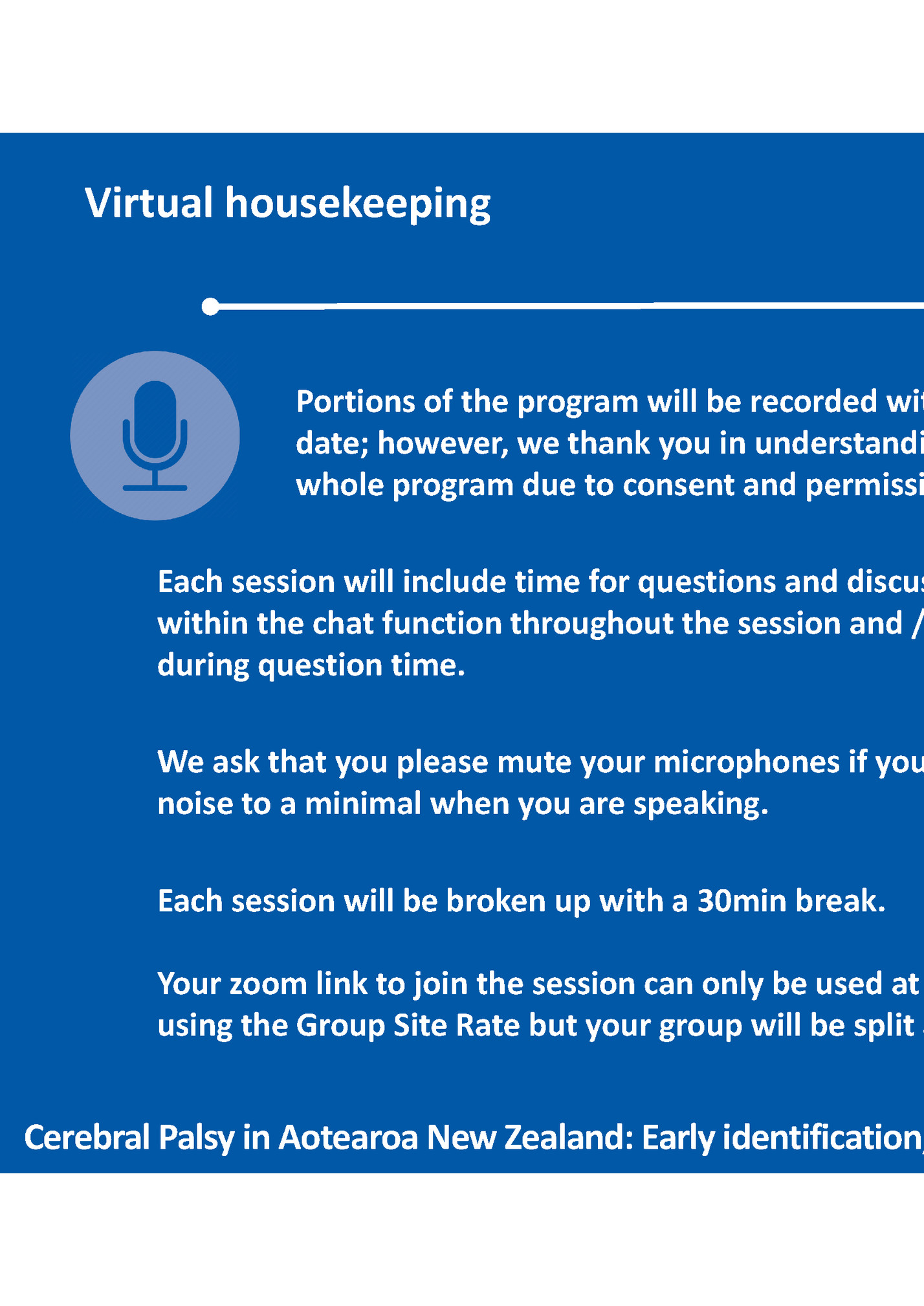
Friday 9 July 2021 Session 1 Current practice 9:00-10:30 CURRENT PRACTICE ON THE IDENTIFICATION, EARLY MANAGEMENT AND HIP SURVEILLANCE FOR CEREBRAL PALSY IN AOTEAROA Speakers Prof Susan N Stott, Dr Sîan Williams, Dr Anna Mackey, Dr Malcolm Battin and Alexandra Sorhage Prof Stott is Service Clinical Director, Paediatric Orthopaedics; Clinical Lead for NZ CP Register and Chair of the NZ Cerebral Palsy Clinical Network. Sue was recently awarded an AusACPDM transformative practice award for inspiration in translating research into clinical practice. She has led multiple research projects on interventions and outcomes for children with CP in NZ and is the lead investigator for the CaPTuRE project and Respiratory Health in tamariki with CP project, funded with Starship Foundation support. Email: s.stott@auckland.ac.nz The opening session will report back on current practices and experiences around the diagnosis and early management of cerebral palsy. This session will discuss key findings from the CaPTuRE project (Cerebral Palsy: Translating Research on Early Identification), funded by Starship Foundation, in addition to related work on use of cranial imaging in the neonatal unit and early hip surveillance practices. Outcomes from a range of research methodologies will be discussed, including family and clinician surveys; clinical audit; co design and data linkage. This information helps to define where we are now in our practice in Aotearoa New Zealand and open the discussion on where we aspire to be in the future. Cerebral Palsy in Aotearoa New Zealand: Early identification, surveillance and beyond Note: Each session includes time for audience discussion and questions
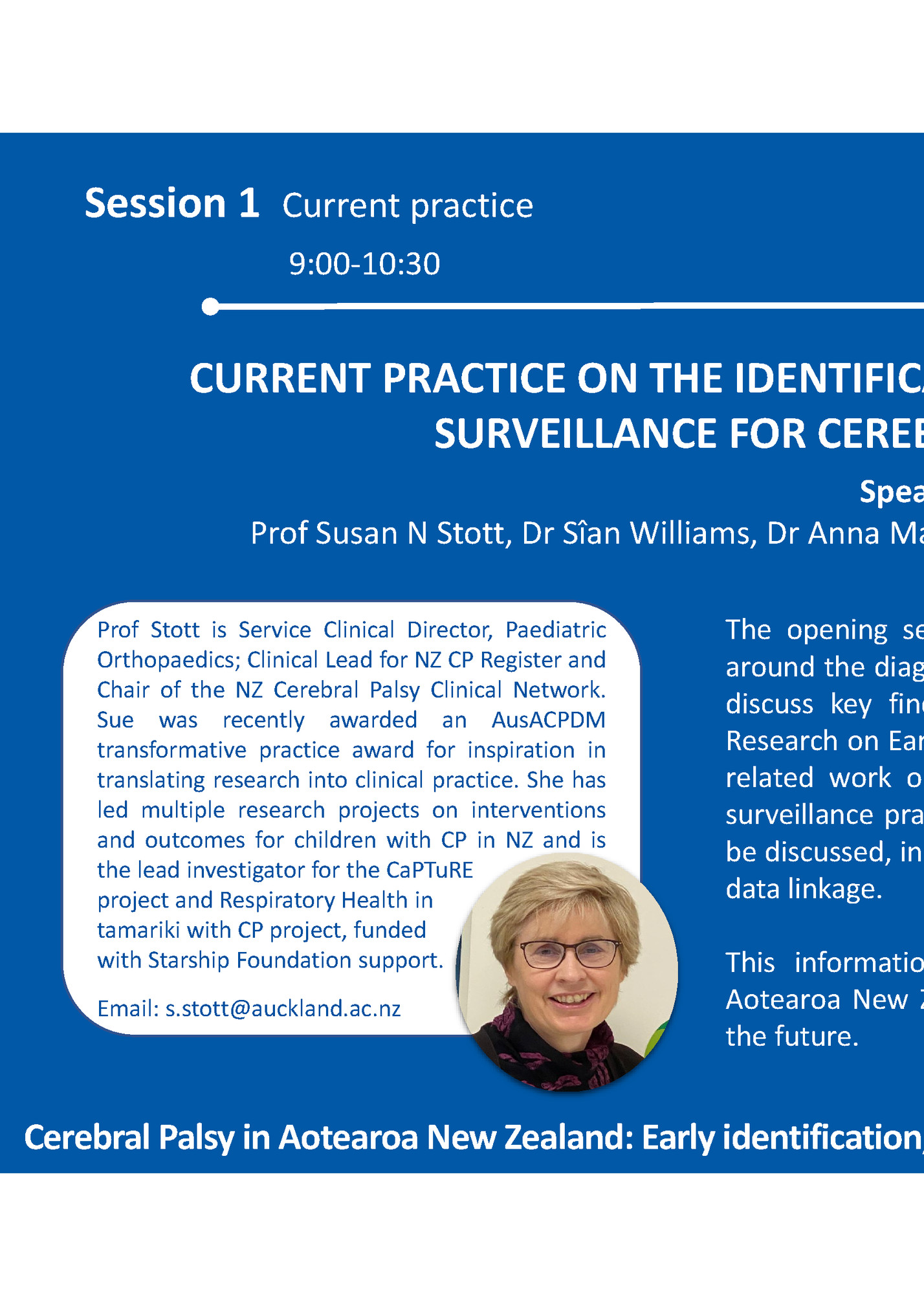
OUR SPEAKERS Dr Sîan Williams is a Senior Lecturer at the School of Allied Health, Curtin University, and post-doctoral fellow with the Australasian Cerebral Palsy Clinical Trials Network, based in Auckland New Zealand. The key focus of Sîan’s work in New Zealand has centred on the early detection of cerebral palsy, supporting the training and implementation of key diagnostic tools for earlier detection, and the generation of new knowledge around current practice- with a large emphasis on involving the family perspective and identifying potential inequities in service access. Sîan is a Board member of the AusACPDM. Email: Sian.Williams@auckland.ac.nz Dr Malcolm Battin Dr Malcolm Battin is a neonatologist who trained in the UK and Canada before moving to New Zealand in 1997. For 11 years he held a joint appointment with the University of Auckland before taking a full-time hospital role in 2008. His research interests are broad but include a focus on determinants of neonatal outcome and neonatal neurology, particularly neonatal encephalopathy. Email: MalcolmB@adhb.govt.nz Dr Anna Mackey Dr Anna Mackey is a Research Officer with the Paediatric Orthopaedic service at Starship Children’s Health, working with the New Zealand Cerebral Palsy Register and Cerebral Palsy related research projects. Anna has a background in paediatric physiotherapy, trained in the General Movements Assessment tool and is a trainer for the Hammersmith Infant Neurological Examination for the CaPTuRE project. Anna is a member of the Paediatric Society of New Zealand, Cerebral Palsy Clinical Network. Email: amackey@adhb.govt.nz Alexandra Sorhage Alexandra Sorhage is a data and research support officer in Paediatric Orthopaedic service, Starship Children’s Hospital and with the New Zealand Cerebral Palsy Register. She is also a representative on the CP Clinical Network Group and the AusACPDM Communications Committee. Having completed a PGDipHSc in Health Informatics and Master’s in Health Science, she has developed a keen interest in using health and Register data to understand areas for improvement in health outcomes for children with CP. Alexandra received the 2019 Wilson and Sweet Fellowship, supporting completion of her Masters thesis “Investigating Current Hip Surveillance Practice in a Tertiary Children’s Hospital”. Email: asorhage@adhb.govt.nz
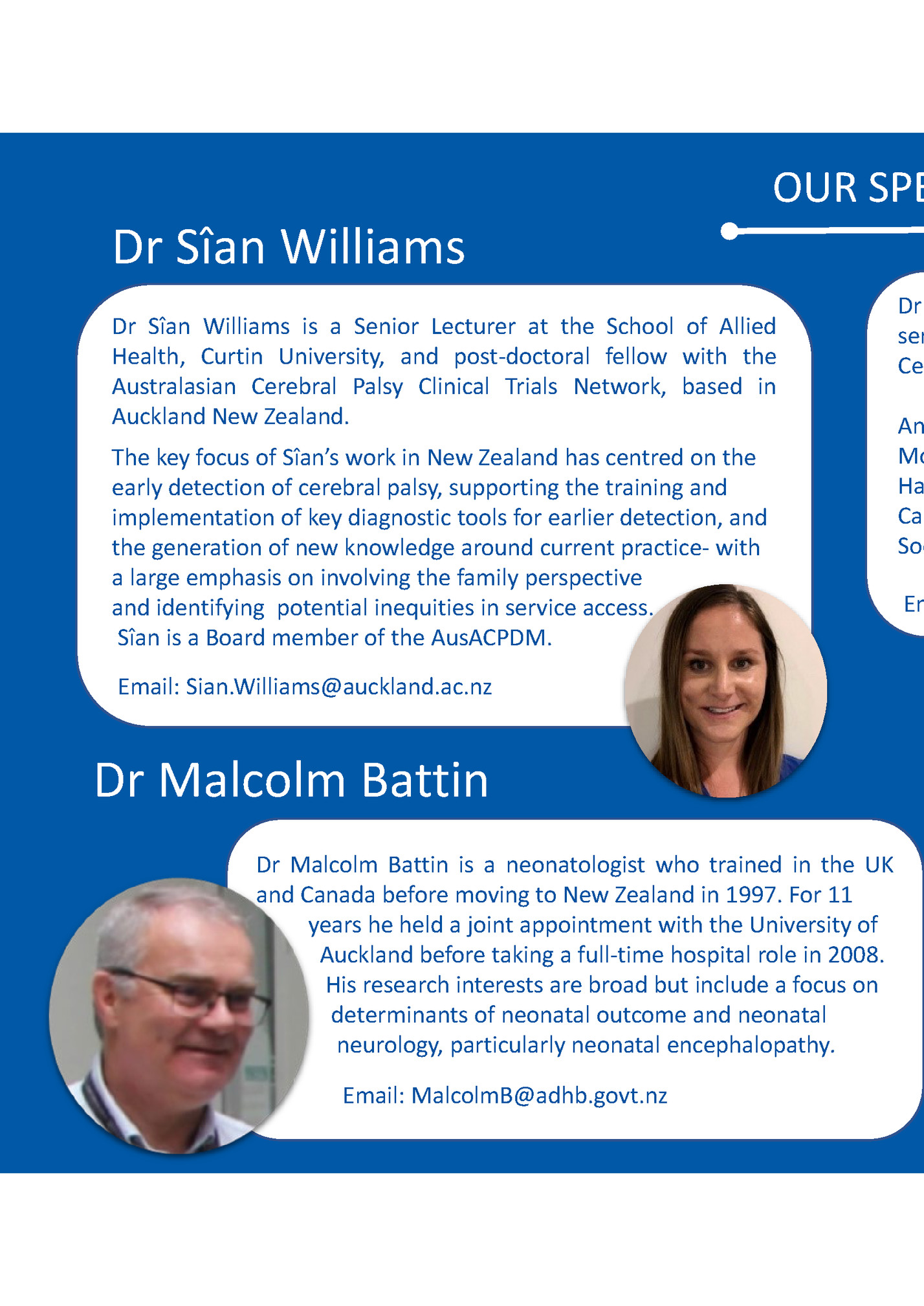
11:00-12:00 Program Friday 9 July 2021 LAUNCH OF THE CP NETWORK EARLY DETECTION GUIDELINES & CLINICAL SIGNS, AND KEY TOOLS AIDING DETECTION OF CP Speakers Dr Angelica Allermo-Fletcher and Dr Sneha Sadani, with Panel discussion chaired by Professor Alicia Spittle In 2017 the landscape of diagnosing CP changed dramatically when an international literature review was published with recommended diagnostic pathways for early diagnosis of CP, enabling diagnosis before 3 months of age. Based on this evidence, we are now launching the NZ Best practise recommendations for early diagnosis of CP, intervention and surveillance, adapted to the clinical settings in Aotearoa, with the hope to improve equity around diagnosis and access to intervention, and improve the future for infants and children with Cerebral Palsy and their whānau. The aims of the Best practise recommendations are to provide an easy to follow clinical guide for early diagnosis of CP before and after 5 months of age, and help reach the Australia New Zealand Cerebral Palsy Strategy’s target of 70% of children with CP being diagnosed before 12 months of age. We will also provide an overview of the recommended criteria for entering the different CP diagnostic pathways and the key clinical diagnostics tools. Cerebral Palsy in Aotearoa New Zealand: Early identification, surveillance and beyond Note: Each session includes time for audience discussion and questions
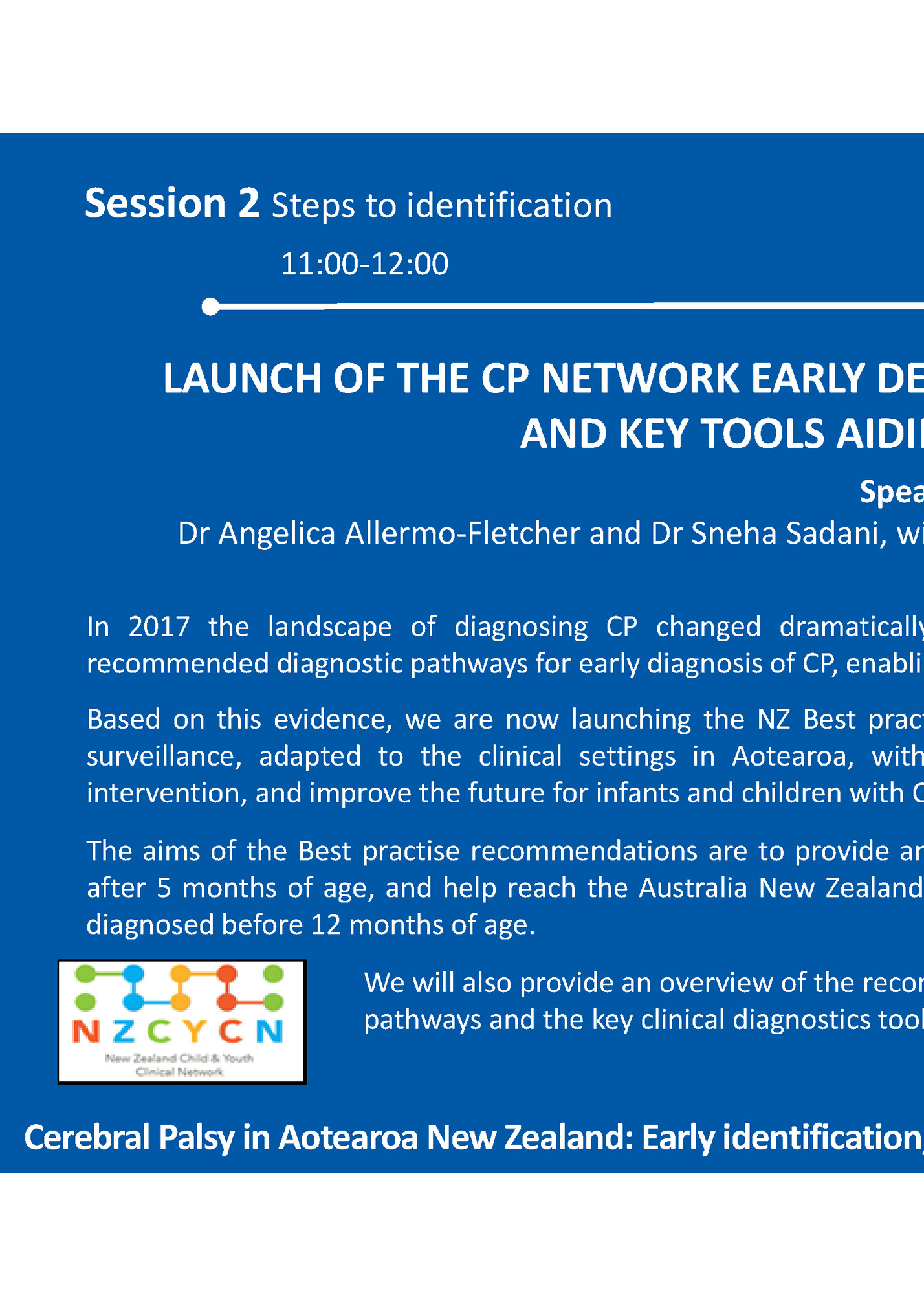
Dr Angelica Allermo-Fletcher Dr Angelica Allermo Fletcher is a neonatologist working in the Neonatal Intensive Care Unit at Wellington Regional Hospital and is a senior clinical lecturer at the University of Otago . Together with Dr Sneha Sadani, she is the co-lead for the CP Clinical Network Early diagnosis and intervention working group. She has a keen interest in clinical practise improvement, particularly in neuroprotective and neuro supportive neonatal intensive care practises, and is trained in General Movement Assessment. She is part of the multidisciplinary team developing an early diagnosis of CP pathway for high-risk infants in Wellington and associated regional hospitals. Email: angelica.allermofletcher@ccdhb.org.nz Dr Sneha Sadani Dr. Sneha Sadani is a Paediatrician at Waikato Hospital and a Honorary Senior Lecturer in Paediatrics Child & Youth Health, University of Auckland. She specializes in Paediatric Neurodevelopment and Disability. Working as part of a multidisciplinary team at the Child Development Centre, she liaises with her colleagues in NICU, Neurorehabilitation and Neurology. Waikato CDC has developed pathways for early diagnosis of Cerebral Palsy & a referral system from NICU involving the visiting Neurodevelopmental teams & Early Intervention providers. Email: sneha.sadani@waikatodhb.health.nz Professor Alicia Spittle Professor Alicia Spittle (Ngāi Tahu) is a paediatric physiotherapist and international leader in early detection of motor impairments and early intervention for infants at high risk of developmental impairments. Alicia is Chief Investigator and co-chair of the Policy & Practice Translation subcommittee for the CRE in Newborn Medicine, and is the Associate Dean Research for the Faculty of Medicine, Dentistry and Health Sciences at the University of Melbourne. She has had an outstanding research trajectory since completing her PhD in 2008, having received over $9 million in research funding, published in the leading paediatric and physiotherapy journals.
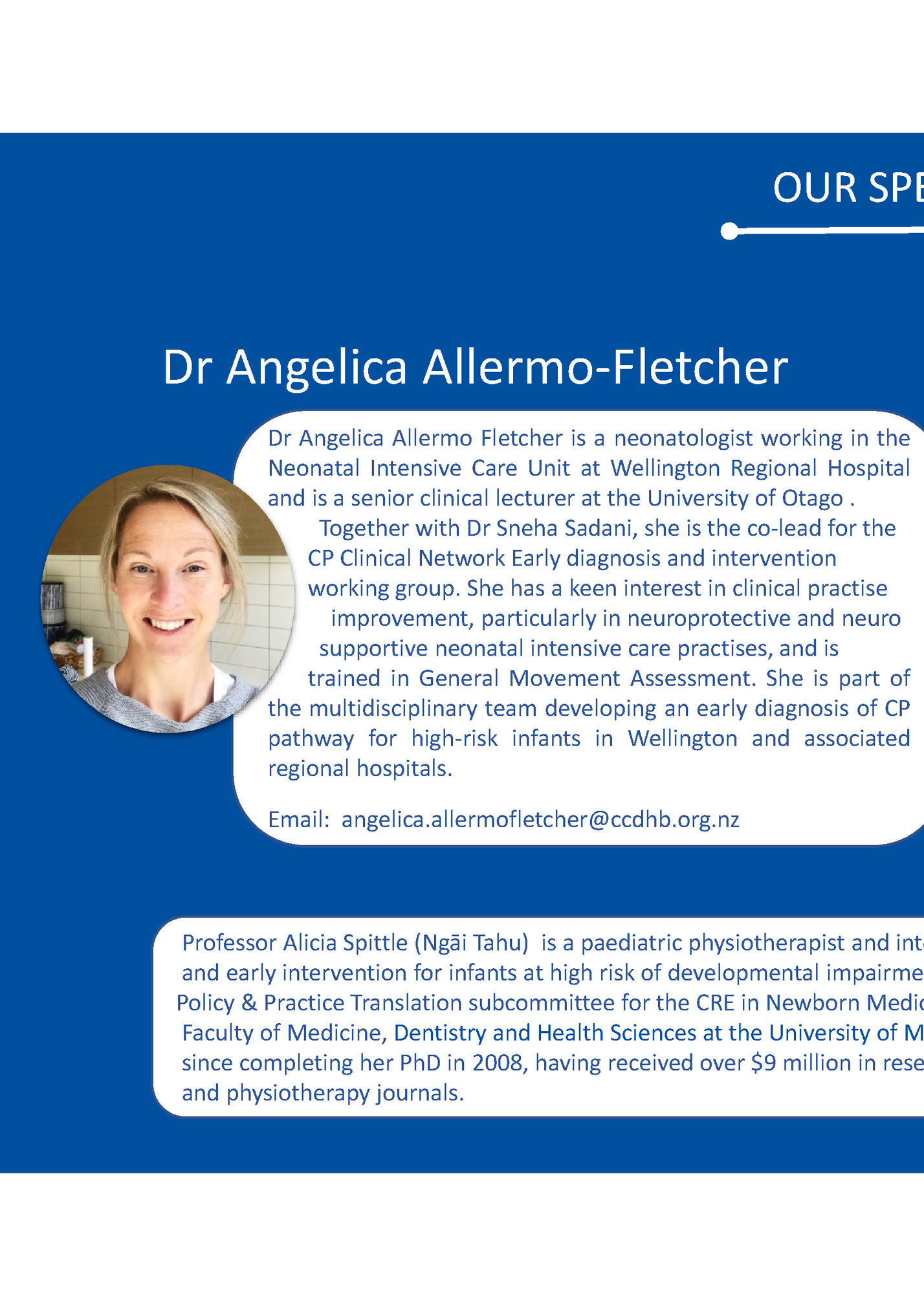
12:30-2:00 Program Friday 9 July 2021 COMMUNICATION WITH FAMILIES: THE FAMILY EXPERIENCE Speaker: Amy Hogan This talk will provide feedback from New Zealand families and Whānau about the family perspective around the diagnosis and early management of cerebral palsy - how they seek honest, open, ongoing communication, they want to be informed and supported. This work is part of a bigger project to inform better communication for individuals and families and will also draw upon evidence from international literature. COMMUNICATION AND REPORTING: KEY INFORMATION AND TIPS FOR CLINICIANS Speaker: Dr Jimmy Chong What does it mean to have cerebral palsy and how can we approach these discussions with families? Cerebral palsy is a diverse condition, where it is often helpful to stratify children into subgroups to describe and communicate clinical information. This session is an opportunity to share ideas and knowledge about the discussion of the diagnosis of cerebral palsy with families, the use of classification systems (including the GMFCS), along with a focus on function and participation. Cerebral Palsy in Aotearoa New Zealand: Early identification, surveillance and beyond Note: Each session includes time for audience discussion and questions
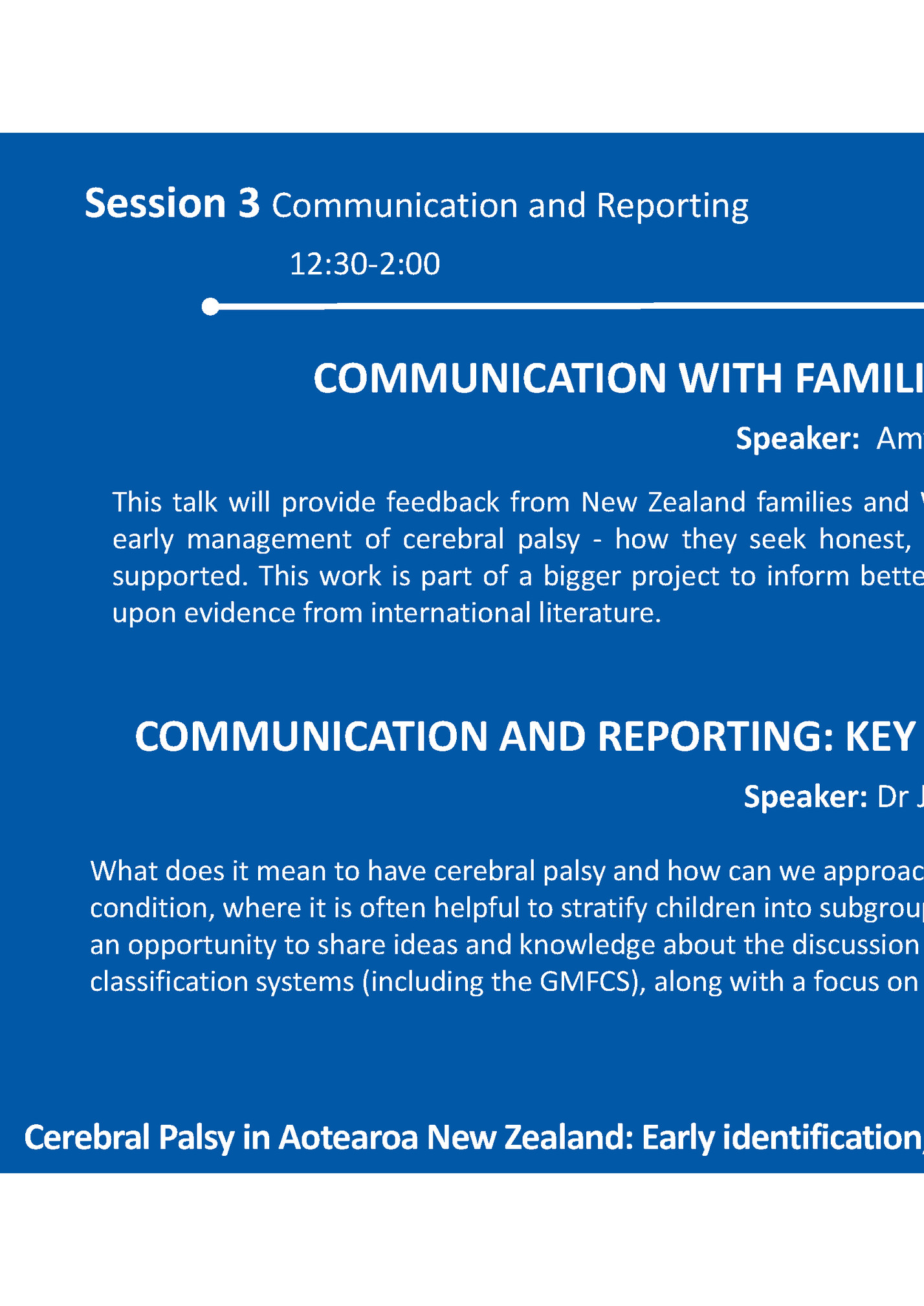
Fleepit Digital © 2021